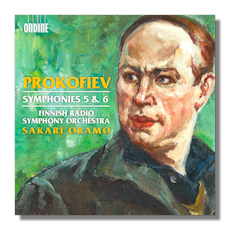
The Internet's Premier Classical Music Source
Related Links
- Prokofieff Reviews
- Latest Reviews
- More Reviews
-
By Composer
-
Collections
DVD & Blu-ray
Books
Concert Reviews
Articles/Interviews
Software
Audio
Search Amazon
Recommended Links
Site News
 CD Review
CD Review
Serge Prokofieff

- Symphony #5 in B Flat Major, Op. 100
- Symphony #6 in E Flat minor, Op. 111
Finnish Radio Symphony Orchestra/Sakari Oramo
Ondine ODE1181-2 80m
Among major conductors of Prokofiev's symphonies the one whose style most closely resembles that of Sakari Oramo is the late Frenchman and principal conductor of the Chicago Symphony Orchestra from 1963-69, Jean Martinon. In his complete early 1970s cycle of the Prokofiev symphonies on Vox Martinon took a lean, energetic but somewhat restrained approach to the music. That's what you generally get here in this Ondine CD of these two Prokofiev masterpieces. Oramo delivers a Fifth Symphony that is more headlong than epic, more rich in detail than thick in orchestral sonorities. With brisk tempos throughout, he paints a less dark canvas in the struggles that emerge in the last half of the first movement and in the tragic middle section of the third. He also imparts a slightly lighter character to the Scherzo and Finale. To cite more specific examples of Oramo's somewhat restrained style here, listen to the big ending of the Fifth's first movement. The huge washes of sound aren't there, as the percussion is less thundering and less forceful, the music sounding more determined and defiant than triumphant and all-conquering. The ensuing Scherzo features some delightful detail from the winds, especially as the music builds toward the ending. However, some listeners will notice that the acid and sarcasm are less pointed throughout this movement.
Much the same kind of treatment endures in the more tragic Sixth Symphony. Tempos are among the briskest I know of in the first and second movements. Of the fifteen or so recordings I have of this great symphony, only Rozhdestvensky and Mravinsky are faster in the first movement and only Mravinsky clocks in ahead of Oramo in the Largo second movement. But that's good company to be in, because these two Russian conductors, Mravinsky especially, are extremely compelling in this powerful tragic Prokofiev symphony. That said, both Mravinsky (Praga) and Rozhdestvensky (Melodiya and other labels) managed to add more weight and angst to the music. By comparison Oramo is busier and less dark, but always a subtle conductor who knows how to phrase the music to get the interpretation he wants. In a sense, he's more objective in his Prokofiev than most conductors and unafraid to scale down sonorities a bit to allow certain detail to emerge from the background or to set the stage for a bigger moment. The powerful buildup in the Sixth's development section is a perfect example of Oramo's style: the first climax, with the trumpet spitting out a fragment of the main theme against punctuating low brass and thundering drums, seems to lack a little punch, but the second climax, with tam-tam roaring and a drum rhythm crushing everything in its path, registers powerfully, albeit with a frenetic anger rather than an overwhelming sense of doom. There's nothing lacking in Oramo's crushingly powerful ending to the Sixth's finale, however, and so it would be unfair to suggest he consistently reins in sonorities or tamps down the decibels.
Oramo, by the way, conducted a number of important performances of the Prokofiev Sixth recently, including with the Boston and Chicago Symphony Orchestras and the BBC Symphony Orchestra. The American critics were approving, but a London reviewer shredded him. You win some and you lose some.
In both works Oramo's Finnish Radio Symphony Orchestra, though comprised of ninety or so members, sometimes sounds a bit less full than most major orchestras, though they certainly play with commitment and accuracy. Incidentally, Oramo has just departed his post as chief conductor of this ensemble (May, 2012). The sound reproduction in both works is clear and powerful, but the piano may just be a little too closely miked. While much of what I've written here would seem to place Oramo's Prokofiev in the controversial realm, in the end it must be assessed as convincing on its own terms. Oramo presents a more unified vision of Prokofiev than Martinon, and a more subtle take on these two symphonies than most other conductors. But the competition is fierce. Bernstein (Sony), Maazel (Decca), Levi (Telarc), Kitayenko (Phoenix Edition) and scores of others in the Fifth present a more epic, perhaps deeper Prokofiev, while in the Sixth Mravinsky, Rozhdestvensky, Weller (Decca), Järvi (Chandos), and especially Kitayenko, deliver a darker more tragic Prokofiev. That said, if you prefer your Prokofiev lean and detailed, busy and spirited, while surrendering some of the music's epic character, Oramo may well be the conductor of choice here. Whatever your tastes, true Prokofievians will want this recording for its highly individual and vital take on these two masterworks.
Copyright © 2012, Robert Cummings





















